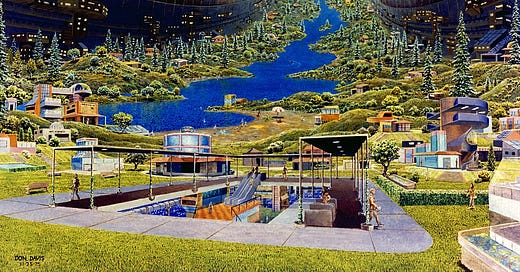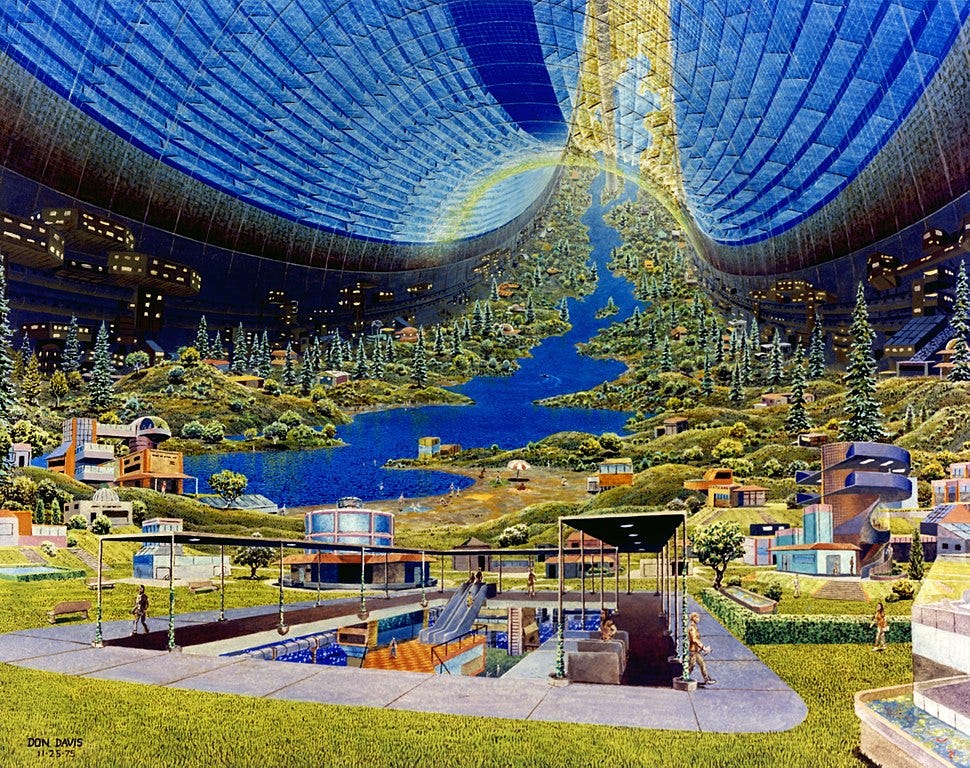Readers have asked me to explain in more detail what I mean by “ecological freedom.” Fair enough: it is a key building block of the book’s overall argument against space colonization. What follows is an iteration of the previous post that delineates the concept more fully.
I call ecological freedom the accumulation of environmental factors and natural phenomena that, over geological aeons, led to the emergence of self-reflexive consciousness among humans, that is, the possibility of freedom.
Freedom is a set of enshrined political and legal rights, as well as an attribute or a function of the human mind. There are many competing accounts of human freedom, theological, philosophical, social, economic. To some, freedom is an inherent quality of the subject or the gift of a divinity, to others it is a construct of history and society, an ongoing struggle to define and assert the agency of individuals within larger communities, families, tribes, clans, nations, all the way to humanity as a whole.
Whatever you take freedom to be, ecological freedom is the precondition for all of it, its material substrate, the soil on which it can grow, so to speak. In that, ecological freedom precedes human society (and philosophizing).
Ecological freedom is the geological and evolutionary coincidence, or happenstance, or kismet, that enabled humans to enjoy and explore free lives, free will, and free association with other humans. It is the beginning of everything. It is also an everyday, physiological reality, the biological a-priori of our sense-perceptions. From the air we breathe and the water we drink to the very shape of our skeletons, it is chiseled in our sinews. Our bodily autonomy and our ability for self-determination, whether as individuals or as societies, are predicated upon Earth’s gravity, Earth’s climate and Earth’s great cycles of chemical exchanges. The emergent property that is human freedom, individual or collective, could not have existed and cannot persist without Earth’s bequest, ecological freedom.
No human entity, no public or private instrumentalities, can assert any form of sovereignty over the totality of Earth’s processes. On Earth, air, gravity, the environment, cannot be the subjects of sovereignty because they are the phenomena that beget sovereignty to subjects. In other words: owning the air we breathe or administering gravity is a non sequitur — on Earth, that is.
Space colonization seeks to extinguish and eradicate ecological freedom beyond Earth by means of technological artifices. It will re-order and reign in the absence and the impossibility of sovereignty over Earth’s life-support system. There is no way around it: onboard the space stations or in the underground tunnels on Mars, someone or some institution of society will build, operate and maintain, and indeed rule over gravity and/or breathable air.
Thus artificially re-created and replicated, the environmental preconditions for human self-determination and self-agency will have to become subjects of human sovereignty. In turn the humans who live in space will have to become the subjects of that sovereign.
I should add that human sovereignty is not necessarily subjugation or servitude. When properly arranged and agreed upon, sovereignty — the polis — is not the enemy of human freedom. On the contrary, it probably constitutes its primary buttress. That said, even the most free and righteous of Earth’s Republics is in fine born of the void of sovereignty that is Earth itself. It arises from its environment, its atmosphere, and the many beings big and small that populate it and collaborate with humans.

On Earth, political sovereignty, the government of humans by humans, flourishes on the totality of Earth’s processes. Down here, political sovereignty, humans, cannot extend their control over the material prerequisites of their own existence. Ecological freedom at once provides the stage for our thriving, yet remains beyond the reach of our command.
Meanwhile, space replicas of Earth are precisely where political sovereignty, and humans, can impose their dominion over the material prerequisites of their own existence. In space, deep in the bowels of the engineered habitats, someone or some institution holds power over the air, over gravity, over the life-support system. What was freely available to all on Earth is no longer.
Space colonization is the antithesis and the end of ecological freedom.
Some will wonder: why would that be a detriment? After all, isn't space colonization fulfilling humanity's mission in the universe? Isn't space colonization rescuing us from the apocalypse? Isn't it worth forsaking Earth and ecological freedom?
The question should be turned on its head. As we will see in the course of this book, it is the myth of space colonization that makes it legitimate to entertain such a fateful surrender, along with the many other surrenders that ensue from that initial transgression.






Added "monetized gravity" to my Worst Muse file.
To live offworld without sacrificing freedom, then, would entail creating a massive, self-sustaining habitat that answers to no executive suite, no board of directors, no shareholders, only to itself. Far beyond our current technology, of course, but a hundred years ago we hadn't even launched anything into orbit.